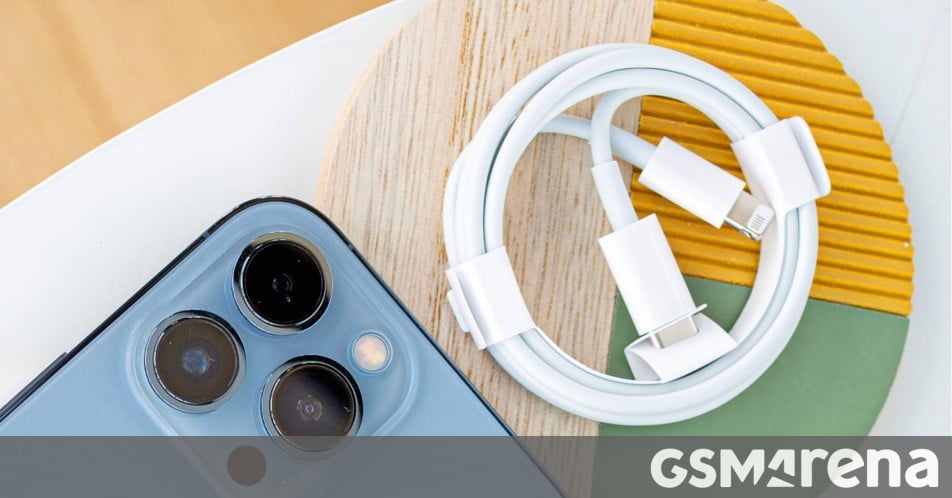And people will be dismembered if they fail to comply.
Well that’s handy, because thanks to the EU that’s what everything will be using anyway.
What else are they going to mandate? That sand remains course and irritating? Or more likely demand that the rest of the world stops laughing at their Jetsons city idea.
Saudi sand actually isn’t course enough
This goes way further than EU rules.
EU regulation only mandates this for phones. This also covers non-phone electronics, such as mice, keyboards, flashlights, handheld fans, ebooks etc. As of 2026, it also applies to laptops.
No, that’s EXACTLY the EU regulation too. Up to and including the 2026 exception for laptops.
I didn’t look into every little detail. But EU’s regulation certainly is not only for phones.
Removed by mod
This will just lead to increased popularity of wireless charging
I still haven’t found a good reason to ever use wireless charging, feels like a gimmick to me Wire is just more convenient.
In order to charge my phone wirelessly, I have to take it out of the case. Which is a bigger pain than just plugging a wire into it.
I actually use wireless charging at night. They way I see it is in cutting down on the wear on my charging port. Plus, the slightly slower charge speeds are probably better for my battery long term
Might be worse for the battery because of increased heat but idk
Cutting wear of is fair point. Fast charging can be disabled if wanted with wired charging so that is not issue. Because of wireless charging, the backlid has to be glass, which is annoying cause it breaks more easily.
The back lid doesn’t have to be glass, my iPhone 14 pro has a metal back and wireless charging works fine
I stand corrected
We’ve hit peak QI, almost.
Even Kindles have it now. Watches, phones, like 4 brands of earbuds I tested the other day (testing power share from the older samsungs), etc.
The only thing that doesn’t have it in our house is my oura ring, which as a G2 is the last one I want to buy from what that company has become, so it’s going to solve itself soon.
The only time I’d even use wireless charging is when I’m in bed. Any other time I need to be able to use my phone when it’s charging.
It seems like a good idea to have it built into a nightstand or built into your desk so your phone charges when you put it down. In practice you have to place the phone down in a very specific spot on the charger for it to work, so it’s hardly more convenient than a cable.
MagSafe battery and all other MagSafe accessories🤷🏻♂️. I charge exclusively by MagSafe aka wireless.
It’s just so incredibly sloooooow
I’ve never had time constraints and you don’t need two hands to charge your phone or have any cables dangling down. If you don’t use it, just put it on the charger. Done
You’ve never EVER had to just “charge real quick” before you head out with low battery? Really?
Government mandates electronics sounds very Communist. I thought were way past that already. Companies should be allowed to compete for charging standards without government interference. Let the invisible hand of capitalism self correct itself, though the heavens fall.
Yes, every government regulation is communism. No dangerous lead levels in drinking water, gasoline, etc.? Communism. Companies should be allowed to compete for lead level standards without government interference. Let the invisible hand of capitalism correct itself.
Yeah well the markets had plenty of time to regulate itself it hasn’t bothered to do so mostly because it contains Apple. Not every piece of government oversight is communism.
True… companies can come up with their charging standards. Just don’t try to sell it in all of EU or Saudi Arabia. Also apple overcharged for the damn cables and they break so quickly. last time I used iphone the cable was 20 euro. While I could buy 20 USB-C cables for that. Never had a broken USB-C cable. not even the ones for AliExpress
Removed by mod
Removed by mod
Removed by mod
Removed by mod
Removed by mod
Removed by mod
Removed by mod
Removed by mod
Removed by mod
Anybody else need to fuck themselves, while you’re at it…
average r/atheism cunt.
The left is being radicalized like the right was in 2016. Its going to get crazy.
?? That’s been said for years, nothing comes of it. Most terror is from the right. If anything does, it’ll likely be a right wing cult using left aesthetics like Adolf coopted the name back then.
Militant atheists tend to be islamophobic, and that’s not a left wing thing, that’s just our western culture, news and often media.
Removed by mod
If it does get crazy, we’re all going to suffer as the government cracks down hard on domestic terrorism.
And just like in 2001, “domestic terrorism” will mean whatever they want it to mean.
deleted by creator
Not that a new connector is around the corner, but I love how people try to act like this will be an achilles heel for these laws. How long will it take to vote in an amendment that updates the connector?
I get it, being anchored to one connection type sounds good now while it’s still somewhat new, but in 10 years it could be a burden. Still, I do not want to go back to the days of every device having a unique barrel connector.
Many people have been taught regulation is bad, not much logic to it.
USB-C as a connector can easily last a decade, much longer for just power delivery.
Exactly! Most electronics are surprisingly low-powered, but USB-C can currently support 100W with a draft spec with upwards of 240W. We’ll be fine for awhile.
Yeah, USB-C is fine for even mid-grade laptops. Realistically, if your device is using more than 100W then it probably has an IEC plug (or at least, an in-line power brick with an IEC port) instead. Pretty much the only thing USB-C isn’t suitable for currently is gaming laptops, because those easily draw upwards of 200W.
They arent suitable for gaming laptops while gaming. They are fine enough to just charge during light/no usage at somewhat reduced speeds.
The USB-C EPR spec allows for 230W charging.
The Framework 16 releasing later this year will be the first laptop to use the spec with a 180w power supply
Kind of nuts to me to be putting anything 200W up anywhere near my butthole
USB-PD 3.1 standardized EPR in 2021; it hasn’t been draft for a while.
I’d be surprised if USB-C was a limitation on phone technology even by 2040. The bandwidth and power delivery capacity are way beyond what are needed now. Data transfers from phones are going to increasingly move to wireless in that time frame too, I expect.
The limitation on the viability of USB-C with phones won’t be the actual technological viability of the standard with respect to phones. Instead, the problem for USB-C for phones will be if another standard comes out and starts being used by other devices that do need higher bandwidth or power delivery capability. Monitors, storage devices, laptops (etc.) will eventually need more than USB-C can provide, even with future updates to its capacity. When those switch over to something new, that will be when phones (and other devices) will need to consider a new standard too.
Usb 1.1 came out in like 1994, I still use it for keyboards and mice, ie the main thing I plug in to my pc. USB 2.0 came out around 1999, that covers most everything else.
Usb 3 is from 2009 or so, most of us don’t bother with them except for storage because they’re overspecced otherwise and usb 2 is cheaper.
Usb 4 will be fine in 2040 unless something weird happens, we’ll still be using usb 2.0 because the cables are cheaper and more flexible than 3.0, we’ll just call it “USBx4.2 base profile”
Remember what we said and acted on 20 years ago about technology? Yeaaahh…That’s what you said right now.
This is speculation based on the combination of physical constraints and changing usage.
Phone batteries today are in the 10-20 watt-hours range for capacity, or at least iphones are and that’s the data I found. Going from the typical ~20W fast charging rate to the full 240W capacity of USB-C EPR would allow a twelve times increase in battery capacity with no change to charge times. Are batteries going to increase in capacity by twelve times in the next 17 years? I’d be shocked if they did. The change from the iphone 1 to the iphone 14 pro max is 5.18Wh to 16.68Wh — a three times increase in 16 years.
Likewise, with data transfer, it’s a matter of how human-device interaction has shifted with time. People increasingly prefer (a) automated, and (b) cloud based data storage, and (c) if they do have to move data from device 1 to device 2, they would rather do it wirelessly than with a physical connection. USB4 on USB-C is meant for 80 Gbit/s = 9.6 GB/s transfers. That’s already faster than high end SSD storage can sustain today, and USB4 is a four year old standard. People on phones are going to be far more likely to be worried about their wifi transfer speeds than their physical cable transfer speeds, especially in 2040.
Then, on top of all of that… USB will continue to be updated. USB-C’s limitations in 2033 will not be USB-C’s limitations in 2023, just as USB-C’s limitations in 2023 are not the same as USB-C’s limitations at its inception in 2014. In 2014 USB’s best transfer rate was 10 Gbit/s, or 1/8 what it can do today.
Why do mobile devices and computer hardware need to utilize the exact same wire? I am fine with their being two, as long as it doesn’t turn back into a half dozen types of cables again.
It’s convenience and efficiency. At the end of the day a single cable can provide that functionality needed for 99.9% of such devices. Getting everything on a single cable format reduces waste, simplifies people’s lives, and even opens up competitive spaces. There’s no need for it to be two cables.
But it’s already multiple cables. I have like 3 dozen cables, with more than a dozen being USB-C and only like 5 of them will fast charge my phone. This will get more absurd and confusing as it’s expanded over varying needs for power per device. I mean at least make some sort of easy cable label requirement.
Your word is the USB-IF’s ear. Though generally speaking there really is an enforcement problem when it comes to cables, sometimes cables don’t even meet basic USB specs much less high-speed high-power specs.
USB4 is actually faster than DisplayPort 2.1 and I don’t think we’ll go past 8k at 165Hz any time soon. When it comes to storage at some point you really want an SFP port currently maxing out at 400Gbit (as opposed to USB4 120Gbit, and that’s asymmetric). For reference: You need to drive the NIC with PCIe 5x16 to saturate that. Unidirectionally. Network speeds are nuts you need specialised hardware to keep up with the cables.
Laptops why yes that’s what USB is for.
deleted by creator
I collect old handhelds. Each one having a unique charging and/or sync cable fuckin sucks and I’m so glad that USB is ubiquitous. My current daily driver has mini USB for data, but charges using a unique connector that plugs into a unique cradle that sends power to the device when hooked into the cradle. Without the cradle, ya ain’t charging this thing.
EU version has review process built-in. Anyways it’ll be hard to get more outdated than lightning.
Well USB-C was published 9 years ago, and has been well-established, nearly ubiquitous for at least 5. Why did this take so long?
This is my first thought when it comes to legislation like this. My representatives in government are the last people I would confer with when it comes to technology, so I don’t think they should pick phone charger standards.
How long will it take to vote in an amendment that updates the connector?
Depends on what corporations and countries are backing it probably.
I thoroughly agree the connector insanity was a pain in the ass (though, being a hoarder of cables it made me a sort of superhero) but I just really dislike governments dictating this kind of thing.
USB-C is a connector shape, so there’s really no need for a USB-D. What you’re thinking of is USB 5.0, except the USB has a penchant for coming up with the dumbest names imaginable. The current latest (I think) version is 3.2 Gen 2x2, so the next major version will probably be called some bullshit like USB 3.2 Gen 2x2+1.
deleted by creator
How immature.
Regardless, I have to say:
Gottem.
deleted by creator
deleted by creator
USB One
Usb1 series 3
USB4 is here and is already being called weird stuff.
USB 3.2 Gen 2x2+1.
Thankfully it’s not the 90s or they’ve called this “USB 3.2 Gen 2x2 Extreme”
Wikipedia lists USB4 Gen 4 (No space between USB and 4, which is different from previous versions which did have a space there).
Following USB4 Gen 2×1, USB4 Gen 2×2, USB4 Gen 3×1 and USB4 Gen 3×2.
okay nerd
If the USB-IF can agree on it, why not?
The USB-IF moves so slowly it might as well be standing still.
I think it’s good for USB standards to move slow.
Finally just about every device I buy has USB-C now. If they release a new connector that’ll just mean using 2 different cables for everything again.
Prince ibin-whateverface is an Android user and finds lightning annoying. That’s all this says to me. He’s not wrong, btw. For once.
See? This is how you should use your authoritarian powers
There is a second stage, starting from April 1, 2026, which will apply to laptops and portable computers.
I’m with them on small devices using USB C, but all laptops is a pretty tall task. Can gaming laptops that need a high voltage even use USB-C? They already struggle with massive charging bricks and thick cables.
The latest USB power delivery standard allows for new voltages of 28, 36, and 48 volts at up to 240 watts at 48V. My current Dell workstation laptop uses two 20V USB C connectors to achieve similar.
I’m imaginining some kind of monstrosity of a gaming laptop with a power cable that looks like a hydra splitting into three or four USB-C connectors, and it’s gloriously silly.
Maybe it’s time for a new thing similar to USB 3.0 micro B, with two USB-C connectors next to each other on the same plug.
Pretty much, they magnet together though so you can split them apart and use them as normal with other devices.
There are already laptops with docking stations that take 2 USB-C connectors. Annoyingly, the docking stations come with a Franken-connector of 2 USB-C plugs in one solid plastic housing so you can only use the dock with a specific laptop.
It would make since to say something like usb-c is required for up to x volts. Then x-y volts require this other kind of charger.
I mean it’s totally valid if the required technology literally can’t handle certain applications that there needs to a level 2, level 3, and onward option.
I’m chuckling at the idea of someone plugging in an early USB-C device and watching it go up in flames as it gets hit with 48v instead of the 5v that it’s rated for. I know USB-C has a chip that is supposed to negotiate power transfer, but it’s still a funny “what if” thought.
Lol where is this “chip” because between the all the cables, chargers, and devices bought off Alibaba or
AliexpressAmazon that’s bound to happen at some point.It’s built into the connector. The connector isn’t just wires soldered to contacts; It’s a PCB with actual circuitry. When you plug a device in, it uses that chip to tell the charger how much power to send. Then the charger receives that signal, and sends the appropriate amount of power.
If the signal isn’t received, then the charger should only send the bare minimum amount that any device should be able to handle, for things like flash drives or peripherals. This is why some of the cheaper cables won’t charge your newer devices, because those newer devices need more power and the old cable isn’t negotiating a high enough power transfer.
It’s ironically one of the biggest complaints that people have about USB-C, because it causes a nightmare in regards to compatibility. Old cables and chargers are constantly being phased out as the standard gets developed for more and more power transfer. And that outdated equipment is still sitting on shelves, waiting to be bought. A cable or charger that you bought a month ago may not be compatible to charge a device that you buy today, because that unit is actually a year old and was phased out six months after it was manufactured and shipped, but has been on a store shelf ever since because a retailer bought a bunch and doesn’t want to write them off as a loss.
It means people are constantly re-buying the same gear at higher specs, simply to keep up-to-date with existing standards. And if you don’t re-buy everything then you have a hodgepodge mix of cables and chargers that all look the same and only some of them will charge all of your newer devices. The older stuff looks the same on the outside, but your new phone will refuse to charge when you try to use them.
That’s not really true. The E-Marker in the cable does not do the negotiations. Its involved in it but its not as complicated as you make it sound. There are a total of 3 different completely backwards compatible cable types in regards to power delivery. 60W , 100W (which is legacy) and 240W.
Ah… so that explains why I have two dozen USB-C cables and only like 5 of them will fast charge my phone.
What kind of phone do you have? All USB-C cables should be able to do at least 60W charging.
S22. Not sure what wattage level I get, but the phone will throw up a message saying something like “low power detected, please check cable” and then it will estimate like 5.5 hours to charge from 22% to full.
Not gaming (obviously!) but the2019 MacBook Pro has a 140W USB-C charger to a single port.
2019 is 96w charger. 140w is 2021 or later.
And isn’t the 140w reserved for the new MagSafe port?
I recently bought a gaming laptop. Specifically a Lenovo Legion 5 with a rx 6600. It has both the big powerbrick charger and can be charged via USB-PD, obv not at the same speed but it is an option that is available.
your gaming laptop is struggling because gaming laptops are scams. you’ll never get the performance you want and you’ll pay the premium anyways.
Probably. But your will have to buy the correct charger and cable. I have a couple 100W cables. The problem is they Al look alike.
The label maker business is about to be booming!
I specifically buy cables with different colors or from different brands as I upgrade, and keep a note around for what their PD capacity is for each set. It’s annoying, but doable.
i think some companies use seperate ports for charging and gaming on gaming laptops
the ASUS ROG STRIX SCAR 17, their biggest baddest gamiest 17" laptop, ships with a power adapter rated for 280W. it also offers charging over USB-PD at up to 240W, so would comply with the regulation here.
deleted by creator
Removed by mod
Removed by mod
Removed by mod
Removed by mod
Will this global push end up limiting miniaturization of electronics? Even if it does, may still be a worthwhile tradeoff.
It aims to eliminate waste by reducing the number of cords and plugs required for various devices. It will surely have to be upgraded and miniaturized as tech progresses, but for now it’s one everyone is agreeing on.
One aspect to consider for miniature devices is wireless charging. My watch and my headphones don’t even have a port
What miniaturization? I generally try to buy the smallest reasonable phone, and every generation they get slightly bigger.
That would be clause 9: “It is also necessary to provide the basis for adaptation to any future scientific and technological progress or market developments, which will be continuously monitored by the Commission”
Common Saudi Arabia W
Let’s be real, they just want to have more of a reason to execute American iPhone-loving tourists 😂
The problem with these types of mandates is it locks us into standards and makes change hard. Imagine if they had done this when the terrible USB port was dominant.
Or, it gives all the power to the USB group. They have a terrible track record (USB-C is a mess).
The other problem is all the cheap devices that have a USB-C port, but will not charge from a real USB-C to USB-C cable. They are the same old USB ports electrically with a new shape.
These are bad laws with good intents.
Standards can be updated. Like the EU standard was from Micro-USB to USB-C. It happens all the time in all fields of technology.
How quickly will a standard be updated if the mandate encourages companies to entrench on the current standard? Industries built around the legislative certainty of the current standard may exert influence to inhibit moves to new standards, even if there are good reasons to move on.
What if we had mandated, by law, that all monitors must use the VGA connector in 1995? Would that have made DVI or HDMI or later technologies less likely to take off?
Suppose a company sees an opportunity for a better standard with such a law in place. They would have to develop the new standard and create the market for the new standard, all while their change is forbidden by law. How can they propose a new standard before actually developing it? Then, after sinking the costs on a hope, they would have to pay more to fight to change the law to encompass the new standard against everyone who likes it the way it is.
Don’t get me wrong. It would be neat if every doodad I had used the same connector. But soon enough, any connector we care to choose is a straitjacket. We raise the standard for improvement from being incremental and iterative to no change short of world shaking all at one go.
It’s locking nobody with no standard. The standard is evolving time to time. This argument of locking the user which by the way is the same as “competition is the better” is the Apple argument to impose it’s locked (walled garden) ecosystem.
It’s well known strategy to argue in a way that isn’t your goal to achieve another one. Apple is a master here. They use this same strategy with the future mandatory easy battery replacement.
I second this. How could anyone argue that regulation is bad for user? Standardization locks user in, what kind of logic is that?
I’m not sure about the SA one, but the EU variant of that law already has this thought through.
It has allowances already for new emerging standards. If USB-D came out, there would be zero law changes required.
always amazed by people who think “well, if we accept USB-C, we will never be able to have any future tech!” as if the regulation hasnt thought of that.
Which clause of the legislation provides for moving on to a new standard, short of new legislation?
That would be clause 9:
"It is also necessary to provide the basis for adaptation to any future scientific and technological progress or market developments, which will be continuously monitored by the Commission
God that last one drives me up a fucking wall. My partner’s laptop refuses to charge with anything except the officially supported power adapter, even though it’s just a USB-C connector. Everything I’ve plugged it into has been rated for the 100W that the laptop needs to charge, but the damned device locks out anything except official chargers under the guise of safety.
That should be illegal.
Nintendo Switch did/does the same
That’s because the Switch’s USB port isn’t actually a USB-C. Their port falls outside of the standard size/dimension specs, because they wanted the Switch to slide smoothly into the dock instead of having a positive click like a standard USB-C should.
This is why using a standard USB-C on your Switch can actually brick the device. Since the port is non-standard, the pins are much easier to accidentally short when plugging a standard USB-C into it. There was a big string of people complaining about bricked devices shortly after the Switch launched, and eventually players just learned to only use the official Switch chargers. But that’s only necessary because Nintendo told the USB-C standard to go fuck itself, and made a port that is almost the same (and will technically accept a standard USB-C port) but does everything slightly differently.
The Switch charger also has a power switching option, since the Switch draws more power when it’s docked than when you plug it in directly. So the power supply is set up to detect whether or not the dock is connected, so it can supply more power.
Unlike pretty much all other standards, all USB documents are open access and allow you to build compliant devices without 3rd party permission. You only need a license if you want to sell devices with the logo and/or need a official Vendor and Product ID (VID/PID). So unless all manufactures are forced to publish documentation for their IO in a similar level of detail, forcing one standard upon everyone is the next best option. Apple gambled on keeping their connector proprietary, and now get the backlash they deserve.
There is a second stage, starting from April 1, 2026, which will apply to laptops and portable computers.
I hate this type of legislation. Almost zero USB chargers can power a laptop. But politicians don’t know that. So this won’t reduce the number of chargers. Unless they’re requiring all charges support the full PD spec?
Leave standards to experts.
Edited: Yes i fucking know many laptops use USB-C power now. You’re not smart in telling me this. I mean that most USB chargers are cheap crap that can’t put out enough power to run a laptop. Not all USB is the same.
They don’t mean laptops have to run off of a phone charger. It says they need USB-C charging ports. Many laptops already run power via a USB-C slot right now.
…and you can charge your phone with the laptop USB-C charger just fine.
Yeah, but that only works when your device uses less than 100W, because that’s what USB-C is currently rated for. Gaming laptops can easily use two or three times that amount while simply idling on the desktop. Once you start looking at GPU/CPU power requirements and active cooling, the power consumption quickly stacks up.
These devices usually have IEC power bricks with a fat barrel connector, because that’s what they require to be able to get enough wattage into the device. Requiring them to charge via USB-C is going to have them using two or three USB-C ports just to break even and avoid losing power. The power adapter would look like some weird fan-out adapter with one IEC power cable going in and three or four USB-C cables on the other end.
I’m laughing at the idea of a device having three or four USB-C ports, and not being able to use any of them for anything except charging.
USB-C has already standardized 240W charging. Apple already ships a 140W brick with their laptops since like a year or two ago, and Framework is shipping a 180W brick later this year.
Okay but that doesn’t change the fact that many laptops have a USB-C port for charging now.
Of course, we’ve now learned that OP meant something a lot dumber about using phone chargers for laptops but this is a whole other imaginary situation OP has going on in their head.
So - like I know that many laptops charge from USB-C right now. The one I’m typing on does. Why do people seem to think they’re smart in pointing this out?
So then what’s the point? People will still be buying cheap USB chargers because, well, they’re cheap. And they’ll have the expensive one for their laptop. Problem…solved?
Nobody thinks they’re smart in pointing it out, and it’s weird that that’s the impression you’re getting. If anything, we’re pointing it out because your comment reads like you have no idea that USB-C charging ports already exist. If you’re looking for someone to blame, look inwards. It’s your own imprecise language and poor writing skills that got you here.
But your new concern isn’t any better. It’s still as inane as what you poorly expressed it the first time. People having been using chargers for decades, and your argument is that all this knowledge will magically be erased because they mandated USB-C on devices causing people to try to charge their laptops, which come with dedicated chargers, with cheap $3 ones off Ali Express? How? Why? What different effect would a regulation like this coming from tech experts instead of politicians have when the problem appears to be suddenly-induced mass forgetfulness of how electricity works? This doesn’t make any sense.
If people already see a USB-C charging port on their laptop, know it came with a dedicated charger, and have access to a cheap USB-C phone charger, then why would they only think to try them together after this regulation passes and not right this very second? What does it even matter if they try? It doesn’t harm anything, it just doesn’t charge or power the device.
I charge my MacBook pro with a 40W Anker brick overnight. Works like a charm. Probably better for the device longevity too…
Leave standards to experts.
That’s what everybody did at first. It gave us a different connector for each device. After a few decades, there are still competing standards. Either the experts are incompetent, or the business environment they’re in doesn’t incentivize single standards.
This is the issue, you can squeeze more money out of your consumers if you lock them into an ecosystem an license every single 3rd party device.
Or, and go with me here, it’s a non-issue? Like it’s fine to have multiple standards for different uses?
All they did was standardize the shape of the connector. Not the voltage, power output, etc. So you’ll still have multiple competing standards and it will be a bit more confusing as “not all USB chargers will be able to power your laptop.”
I dunno about the SA law but the EU law mandates USB-PD support.
Of course they can’t mandate the wattage level since every device will have different wattage needs, but I can use my $35 100W USB-PD charger with any USB device I have at home just fine
What is the law solving then? You still have many chargers with different support for power, voltage, etc. You just have one “shape” now. And I’ll still have multiple adapters since I’m not shelling out 240W prices to have a charger in my car for my phone.
It’s just standardization for the sake of standardization.
Or, it’s totally not a non-issue? Like, I remember the time when you had to carry around a fucking proprietary charger for every single fucking device?
Yeah, no shit, you can’t power your megaultragaminglaptop4000™ with a 5 V 500 mA charger. Whodathunk.
Like, I remember the time when you had to carry around a fucking proprietary charger for every single fucking device?
Oh yes - we refer to those days as “the dark days”. I’m still scarred for life for having to have multiple chargers.
You can have “a preferred state” without “passing a law enforcing it.” The world is marching towards USB as it is. Passing a law for this was stupid and useless.
🥱 Oh look, Mr Gotcha is still on it.
Honey, you were so close from realizing what utter bullshit you’re talking when you moved from „tHeY jUsT sTaNdArDiZeD a CoNnEcToR“ to „it’s a collection of standards!“.
Don’t cry, you can still use as many chargers as you want, that’s okay. You’re okay.
You said it yourself „leave standards to experts“. I suggest you do that and go outside and play with the other 3rd graders, mh?
Honey, you were so close from realizing what utter bullshit you’re talking when you moved from „tHeY jUsT sTaNdArDiZeD a CoNnEcToR“ to „it’s a collection of standards!“
You realize USB has more than one protocol for power delivery right? In what way do you think those two statements are contradictory? And within those standards are a range of viable voltages and power outputs. Not every USB charger can deliver the power to a laptop. Most can’t.
I don’t want multiple standards - I’m just saying it’s idiotic to pass a law requiring one connector.
The purported purpose of this law is to “reduce e-waste” and I believe it will do no such thing. 240W USB adapters are expensive so people will continue to buy the low-cost cables and chargers for, e.g. charging their phone on their desk at work.
Look, there’s no need to repeat your incoherent drivel ad nauseam. Nobody cares what the fuck you think other people will do.
The only valuable thing you’ve said in the last days was, again, „leave standards to experts“.
Since you seem to be really slow on the uptake: you’re not one of them.
Now please go outside and play with the other children, okay?
When I’m travelling, I can bring one single charger to charge my laptop, my phone, my tablet, my wireless earbuds, my flashlight, my powerbank, my e-Reader and my bike pump.
In your world I would have to bring eight different chargers. That’s a pretty big issue to me.
So we’re just passing laws for convenience then?
In your world there are multiple operating systems. It’s a pain for me so I think there should be only one.
It does not say that it has to ONLY have UBC-C charging, my laptop will charge from USB-C and the dedicated charging port. I wonder if that would be complaint.
I have 6 laptops that can charge from type-C, including from battery banks and the last “cell phone” charger I got (OnePlus 9).
???
Most laptops charge over USB C nowadays
What do you mean? My M1 MacBook charges just fine on USB-C. Do you mean that 1A USB chargers can’t do the job? Cause they can’t
yes - this is exactly what I mean. They’ve legislated the interface but not the standard.
It’s all part of the USB standard, there can be different “levels” of chargers. If I’m just travelling with my phone, I don’t want to have to bring a 240W charger. It would be way too expensive and also too big/heavy. The good thing is, if you have to bring a big charger anyway, you can also use it to charge your phone or your headphones. That’s what the standard is all about.
So then what problem has been solved? Ostensibly this was to reduce the number of chargers and cables. But that situation will still exist with this law. You may have some more convenience but… Is that worth passing a law over?
I don’t know exactly what the percentage of new laptops that can use USB-C charging is, but it’s a pretty large percentage. My Lenovo Yoga came with a USB-C charger and that’s all it uses for charging. That said, I actually do agree with you that this is not really a problem for laptops and IMHO it’s often a lot easier to fix/replace a broken DC barrel type charging port than a USB port on a laptop because a DC barrel generally just has 2 relatively large solder points. I’m a lot more nervous handling my laptop with a USB-C charging cable attached than I would be with a DC barrel. However, I’m in favor of legislation that reduces the number of proprietary port standards (like Lightning).
You people are missing the fucking point. Not all USB-C chargers are the same. It’s just the shape of the connector. There are many power delivery standards and not all will drive your laptop.
It would be so stupid if every USB-C charger was forced to deliver enough power for a laptop. They would have to be much bigger and also more expensive without offering any benefit when charging smaller items.
The good thing about USB is that my laptop charger can also charge my phone or my wireless earbuds, so when I’m travelling, I only have to bring the charger for the biggest device I’m using.
Not sure I get your complaint, most people will just use the charger their laptop comes with. With this legislation that charger would be a usb-c and therefore able to power most other devices so you’d only need to bring your laptop charger when you travel, I do this now with my Mac charger which works with my phone, switch, headphones, vape etc. , reducing the amount of chargers you need. Sure someone might lose their charger and buy a cheap one or just bring their phone charger and realize it doesn’t work, but that’s there problem for not researching and they’ll learn that they need a special charger for their laptop. We shouldn’t let a few idiots ruin things for everyone.
I run an M1 Macbook off USB-C daily.
They’re adopting the standards created by the experts from the USB consortium, which is comprised of all the large electronics manufacturing companies. If they’re not expert enough then who is?
The experts know that ‘not all USB-C is the same’. You pick up a $20 USB-C charger from Walgreens you think that’s going to run your nvidia 3080 laptop??
It doesn’t have to though?
Can you currently buy anything that would power a 3080 laptop from Walgreens? Not sure what point you’re trying to make. They’re standardizing the port not the chargers or the cables.
How can you complain about the government forcing a single standard on us while also complaining that there’s too much variation in the market?
You also can’t use a $20 USB-C charger to power a refrigerator, but are you upset that they both use the same wall socket?
Can you currently buy anything that would power a 3080 laptop from Walgreens? Not sure what point you’re trying to make. They’re standardizing the port not the chargers or the cables.
This is my point. They haven’t standardized anything but the shape of the plug. It’s a stupid law. USB is NOT a standard. It is many standards. USB-C and do 5V, 9V, 12V, 20V. And USB cables are not all capable of the different voltages and current either.
So what problem has been solved? There will still be myriad chargers and combinations of things that do and don’t work. The shape of the adapter will just be the same. Groovy.
You also can’t use a $20 USB-C charger to power a refrigerator, but are you upset that they both use the same wall socket?
That wall socket puts out a reasonably standard voltage (depending on country) and a reasonably standard amperage.
So how is it an improvement to have the same myriad of different charging standards but also multiple different port configurations? Cables are capable of all these voltages but the charging circuitry is not and your USB-PD laptop charger will charge phones and anything else that share the same port. Adding a different port just ensures that you must buy different chargers/cables for each device. It also means that all accessories are useless once a manufacturer changes their proprietary port design.
I won’t argue that they could do a better job unifying additional standards like power delivery and data transfer speeds, but eliminating useless variations is an improvement regardless of how you want to spin it.
So how is it an improvement to have the same myriad of different charging standards but also multiple different port configurations?
If you think that’s my argument then you, and a dozen or so others, have sorely misunderstood anything I’m saying.
The purpose for these laws is ostensibly to “reduce e-waste” which is complete BS. And I know it’s BS because practically everyone arguing with me is NOT making that argument. It’s all about personal conveniences which is an abuse of state power and often has unintended consequences.
My laptop charges only over usb-c
Good for you. You missed the point entirely but I’m proud of you and your laptop.
I read your edit and I get it now. The power output of different chargers are not the same. My phone charger is 15 W, and my laptop charger 65 W (or maybe 45 W? I forgot). Charging my laptop with my phone charger does not work.
Yes, there are USB-C chargers that are made for smaller devices and can’t charge a notebook. So what? The alternative would be going back to proprietary chargers that can only charge one specific model.
I have a 100W USB-C-charger in my car, I have one by my bed, one on my couch, one at my desk and one powerbank that can charge my notebook anywhere I go.
Going back to proprietary chargers would mean if my notebook breaks, I can throw all these chargers in the trash and buy a new set. How would that make anything better?
The alternative would be going back to proprietary chargers that can only charge one specific model.
I realize you’re exaggerating but all you’re doing is standardizing on size and shape of the connector. Not the power standards it supports. If your laptop needs 240W PD 3.0 and your car supports 100W QC3 you’re still out of business. If your laptop uses QC3 but needs 12v and the adapter only supports 9v you’re still out of business.
USB is not a standard. It is a collection of standards.
I have never had a 65W+ USB charger that had trouble charging any of my USB-C devices, including my notebook. Yes, USB has different standards, but most chargers support several different ones. Especially with third-party chargers, people want them to work with their device no matter what it is and USB makes it easy for manufacturers to offer that.






























